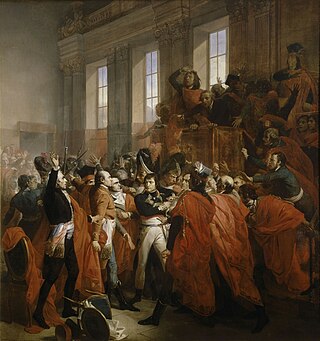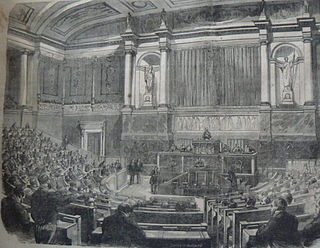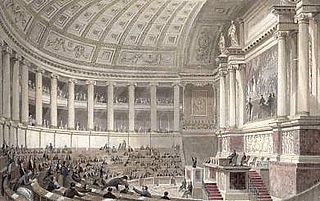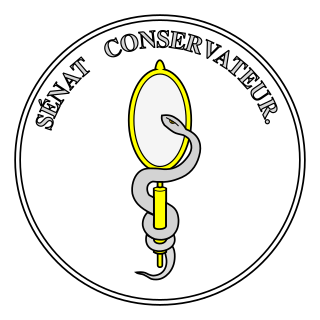
Eugène Rouher was a French statesman of the Second Empire.

The Second French Empire, officially the French Empire, was the government of France from 2 December 1852 to 4 September 1870 between the Second and the Third French Republics. Ruled by Louis-Napoléon Bonaparte, the period was one of significant achievements in infrastructure and economy, while France reasserted itself as the dominant power in Europe.

The French Second Republic, officially the French Republic, was the second republican government of France. It existed from 1848 until its dissolution in 1852.
Tricameralism is the practice of having three legislative or parliamentary chambers. It is contrasted with unicameralism and bicameralism, which are both far more common.

The Coup of 18 Brumaire brought Napoleon Bonaparte to power as First Consul of France. In the view of most historians, it ended the French Revolution and would soon lead to the coronation of Napoleon as emperor. This bloodless coup d'état overthrew the Directory, replacing it with the French Consulate. This occurred on 9 November 1799, which was 18 Brumaire, Year VIII under the short-lived French Republican calendar system.

The Constitution of the Year VIII was a national constitution of France, adopted on 24 December 1799, which established the form of government known as the Consulate. The coup of 18 Brumaire had effectively given all power to Napoleon Bonaparte, and in the eyes of some, ended the French Revolution.

The Constitution of the Year XII, also called the Organic Sénatus-consulte of 28 Floréal, year XII, was a national constitution of the First French Republic adopted during the Year XII of the French Revolutionary Calendar.

Simplon was a department of the First French Empire. It was named after the Simplon Pass. It was formed in 1810, when the Rhodanic Republic was annexed by France. Its territory corresponded with that of the present-day Swiss canton of Valais.
The Tribunat was one of the four assemblies set up in France by the Constitution of Year VIII. It was set up officially on 1 January 1800 at the same time as the Corps législatif. Its first president was the historian Pierre Daunou, whose independent spirit led to his dismissal from the post by Napoleon Bonaparte in 1802. The Tribunat assumed some of the functions of the Council of Five Hundred, but its role consisted only of deliberating projected laws before their adoption by the Corps législatif, with the legislative initiative remaining with the Council of State.

Pierre Jules Baroche was a French statesman, who served as minister in several of Napoleon III's governments. He was Minister of the Interior from 15 March 1850 to 24 January 1851, Minister of Foreign Affairs from 10 April 1851 to 26 October 1851, President of the Conseil d'État from 30 December 1852, briefly Minister of Foreign Affairs again from 4 January 1860 to 24 January 1860, Minister without portfolio from 3 December 1860, and Minister of Justice from 23 June 1863 to 17 July 1869.

The Corps législatif was a part of the French legislature during the French Revolution and beyond. It is also the generic French term used to refer to any legislative body.

Chamber of Deputies was a parliamentary body in France in the 19th and 20th centuries:

The French Constitution of 1852 was enacted on 14 January 1852 by Charles Louis Napoléon Bonaparte. Slightly modified later that year, on 25 December 1852 the constitution became the basis for the creation of the Second French Empire.

The succession to the throne of the French Empire was vested by Bonapartist emperors in the descendants and selected male relatives of Napoleon I. Following the end of the Second French Empire in 1870, Bonapartist pretenders descended from Napoleon I's brothers have maintained theoretical claims to the imperial office.

The Sénat conservateur was an advisory body established in France during the Consulate following the French Revolution. It was established in 1799 under the Constitution of the Year VIII following the Napoleon Bonaparte-led Coup of 18 Brumaire. It lasted until 1814 when Napoleon Bonaparte was overthrown and the Bourbon monarchy was restored. The Sénat was a key element in Napoleon's regime.

Justin Napoléon Samuel Prosper de Chasseloup-Laubat, 4th Marquis of Chasseloup-Laubat was a French aristocrat and politician who became Minister of the Navy under Napoleon III and was an early advocate of French colonialism.

Olivier Émile Ollivier was a French statesman. Starting as an avid republican opposed to Emperor Napoleon III, he pushed the Emperor toward liberal reforms and in turn came increasingly into Napoleon's grip. He entered the cabinet and was the prime minister when Napoleon fell.
The deputy prime minister of France is a position which existed at times in the government of France between 1871 and 1958. It was titled vice president of the Council of Ministers, or vice president of the Council for short.

Prince Imperial of France was a title originally created under the Constitution of the Year XII, in 1804, to designate the eldest son of the Emperor of the French under the First French Empire. The title was, furthermore, revived under the Sénatus-Consulte of 25 December 1852, to serve the same role under the Second French Empire. Unlike the similar titles of Prince Imperial of Brazil and Prince Imperial of Mexico, however, the title could not be kept in use by the House of Bonaparte after the death of Napoléon, Prince Imperial, as the wording both of the Constitution of the Year XII and the Sénatus-Consulte of 25 December 1852 explicitly specifies that the title shall be borne by the eldest son of the Emperor.

In France, the right to dissolve a chamber of parliament—i.e., prematurely terminate its term to trigger an election—has been vested in the Head of State or, in exceptional cases, the Government or even one of the chambers. Dissolutions have occurred under various regimes since 1802, including the First Empire, the Restoration, the July Monarchy and the Third, Fourth and Fifth Republics.
















